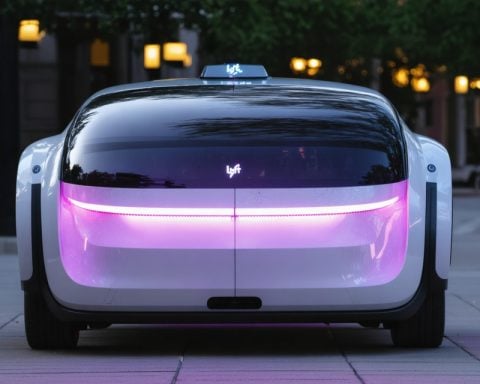- Approximately 257,000 vehicles in the U.S. have been recalled by Ford and Rivian due to safety concerns.
- Ford is addressing issues with unsecured seatbelt anchors in 2020 Ford Explorer and 2021 Lincoln Aviator models.
- Rivian is handling faulty headlight control modules in 2025 R1S and R1T vehicles, which may fail in cold temperatures.
- Both companies are offering free repairs, urging customers to visit dealerships for necessary fixes.
- Consumers are reminded to be vigilant by regularly checking for recalls to ensure vehicle safety.
A wave of vehicle recalls has washed over the United States, sweeping up approximately 257,000 cars in its wake. Ford and Rivian navigate troubled waters, each grappling with serious component issues that could compromise driver safety.
Picture this: the sleek lines of a 2020 Ford Explorer or the commanding presence of a 2021 Lincoln Aviator. Beneath their polished exteriors, however, lies a hidden peril. Ford has alerted owners these models, possibly housing a ticking time bomb in the form of unsecured seatbelt anchors. In a crash, a loose belt could spell disaster, leaving occupants vulnerable. To counter this potential threat, Ford proposes a free examination and repair, urging owners to visit their nearest dealership for peace of mind.
Elsewhere on the automotive landscape, Rivian faces its own set of challenges. Imagine cruising in a brand-new 2025 R1S or R1T, only to find your headlights fail when temperatures drop. Their engineers discovered that some vehicles were equipped with faulty headlight control modules, causing low beams to conk out just when you need them most. Rivian responds by pledging prompt fixes at no cost, easing the concerns of adventurous spirits eager to hit the open road in their electric beauties.
As these automotive giants step up to rectify these vulnerabilities, the lesson for consumers is clear: vigilance is key. Regularly checking for recalls and addressing them promptly can prevent mishaps and ensure a safer, more secure drive. The roads, though full of potential perils, become more navigable when manufacturers and owners unite to prioritize safety. So, take heed, stay informed, and ensure your vehicle is ready to tackle the twists and turns ahead.
How to Navigate the Latest Vehicle Recalls by Ford and Rivian
How-To Steps & Life Hacks for Handling Vehicle Recalls
If you’ve received a vehicle recall notice, here’s a step-by-step guide to ensure your safety:
1. Verify the Recall: Determine if your vehicle is affected by visiting the National Highway Traffic Safety Administration’s (NHTSA) official website. You can enter your Vehicle Identification Number (VIN) to check for specific recalls.
2. Contact Your Dealer: Reach out to your local dealership to confirm if repairs are necessary for your vehicle, and schedule an appointment. Ford and Rivian have pledged prompt repairs at no cost.
3. Stay Updated: Sign up for recall alerts on the NHTSA website. This ensures you are aware of any future recalls on your vehicle.
4. Maintain Records: Keep documentation of all recall-related repairs for future reference or resale value.
Real-World Use Cases
– Ford Explorer and Lincoln Aviator (2020-2021 models): These owners should focus on checking the seatbelt anchors to prevent potential safety threats in a collision.
– Rivian R1S and R1T (2025 models): For those in colder climates, it’s vital to address headlight module issues to avoid loss of visibility in cooler temperatures.
Market Forecasts & Industry Trends
The automotive industry is increasingly leaning towards technological advancements and integration of smart systems, leading to more recalls related to software and electronic components. According to a study by IHS Markit, the trend of increasing recalls is expected to continue as vehicles become more complex.
Reviews & Comparisons
– Ford: Known for reliability, but recent recalls highlight the need for vigilance regarding manufacturing quality.
– Rivian: Emerging as a strong contender in the electric vehicle market, but early challenges indicate room for improvement in component quality control.
Controversies & Limitations
Both Ford and Rivian are navigating challenges related to manufacturing consistency as they integrate more sophisticated technology. There’s an ongoing debate over whether the rush to innovate sacrifices safety and reliability.
Features, Specs & Pricing
– Ford Explorer & Lincoln Aviator: Prices start around $32,000 for Explorers and $51,000 for Aviators, with features focusing on traditional combustion engines and advanced safety systems.
– Rivian R1S & R1T: These electric vehicles start at approximately $74,000, boasting eco-friendly credibility with advanced driver assistance systems and rugged design catering to off-road enthusiasts.
Security & Sustainability
For both automakers, addressing these recalls showcases a commitment to customer safety and emphasizes sustainability and ethical manufacturing practices through transparent handling of faults.
Insights & Predictions
– Recalls and technology: Expect more recalls related to software updates and electronic components as cars become smarter and more connected.
– Consumer response: Brands that handle recalls effectively will likely maintain customer trust and loyalty.
Tutorials & Compatibility
Keep up with vehicle maintenance schedules, and take advantage of dealership tutorials on how to ensure your vehicle is recall-free. These checks should be part of routine maintenance.
Pros & Cons Overview
Pros:
– Free repairs from manufacturers.
– Improved vehicle safety and performance post-recall repairs.
Cons:
– Potential inconvenience due to vehicle downtime during repair.
– Risk to safety if recalls are unaddressed.
Actionable Recommendations
– Check Regularly: Enter your VIN on the NHTSA website regularly to stay informed about your vehicle’s recall status.
– Schedule Repairs Promptly: Don’t delay in addressing recall notices to ensure your vehicle remains safe.
– Keep Informed: Stay updated on automotive news and trends to anticipate any future issues.
For more vehicle safety tips and updates, visit the National Highway Traffic Safety Administration.
















